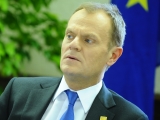Security Shapes European Parliament Elections in Poland
16 May 2014
By Piotr Buras for European Council on Foreign Relations (ECFR)
This article was external pageoriginallycall_made published by the external pageEuropean Council on Foreign Relationscall_made on 29 April 2014.
A few months ago, a defeat of the ruling Civic Platform (Platforma Obywatelska) seemed to be the most likely outcome of the European elections. After seven years in power Tusk’s government and party has lost much of its appeal through its inability to convince people about their sense of direction and propose new ideas for the country’s modernization.A Civic Platform defeat in the European elections would boost the chances of the national-conservative Law and Justice party (Prawo i Sprawiedliwość) in the parliamentary elections to be held in 2015.While a victory in 2015 for Law and Justice would be limited by their struggle to form a coalition, it would represent a political comeback for the moderate Eurosceptic (they do not oppose Polish EU membership per se) and largely anti-German movement, which would have a considerable impact on the Polish European discourse and Poland’s policy towards the EU. Most notably, the prospects of Poland’s accession to eurozone would become even more distant and gloomy – the stronger the Eurosceptics, the slimmer the chance of achieving the two-third majority required for the necessary change of the constitution.
However, the Ukrainian crisis has changed the context of Polish politics and will most probably have an impact on the outcome of the European elections and Poland’s EU agenda. According to a recent poll by the Centre for Public Opinion Research (Centrum Badania Opinii Społecznej, CBOS) 47 percent of the population perceives a threat to the country’s security. It is the highest number since 1991 and the first time since then that people feeling secure (41 percent) have been outnumbered by those who do not. This atmosphere coupled with a broader shift in public attention from domestic to security issues has allowed Tusk to regain ground. The opposition found it difficult to attack the government in this particular field as Tusk and Foreign Minister Radosław Sikorski were active and visible while defending Polish interests on the European level (Weimar mission in Kyiv, Tusk’s round-trip through EU capitals, EU energy union initiative) and trying to forge an all-party consensus in light of the rising security risks in the Eastern neighbourhood.
The opinion polls show that the Civic Platform (a member of the European People’s Party) was able to take advantage of these new circumstances and its support has been rising in recent weeks at the expense of the Law and Justice (a member of the European Conservatives and Reformists,ECR) but also of the smaller parties (Alliance of the Democratic Left SLD , left-liberal Your Movement as well as conservative and right-wing groupings) which have struggled to find their place in a political environment increasingly polarised along the Tusk-Kaczynski axis. According to recent polls the election will be a head-to-head competition between the ‘big two’ receiving around 25-30 percent of votes. Apart from the Left, other parties are on the verge of the electoral threshold of 5 percent.
The Ukrainian crisis gave new impetus to the debate on Europe and its implications will reach beyond the European elections. The securitization of the European discourse has been reflected in the comments of leading representatives of public authorities (such as Donald Tusk and President of the National Bank, Marek Belka) suggesting that the new international context serves as an additional argument for Poland’s accession to the eurozone. Although these declarations have been not followed by any redefinition of Poland’s accession strategy (no concrete date of accession or roadmap), the membership of the eurozone seems to be considered by a part of the political elite as a security guarantee no less meaningful than NATO. Also the Polish initiative to set up an EU energy union (with centralised powers in negotiating gas and oil supply contracts, and massively increased funding for energy infrastructure) can not only pay off for the government in the election but will most probably open a space for a new dynamic in the EU energy and climate policy (with Poland being in need to show more flexibility with regard to the climate policy package if it wants to achieve its goals in the energy security realm).
While Civic Platform reiterates that “those who weaken the EU act against Poland” and its electoral slogan is “Secure Poland in a strong EU”, its opponents from the right do not actively attack the EU but are trying to re-focus the security debate on transatlantic cooperation and hard military issues. Kaczynski advocates deployment of NATO (US, not German) troops in Poland and massive strengthening of the Polish army. With regard to the EU, the Law and Justice manifesto calls upon a communitarisation of family policy to tackle the demographic crisis, and an introduction of a monthly child benefit of €100 from the EU budget.
Despite the Ukrainian crisis and the changing policy discourse, the European election is considered first of all as a test before the 2015 general election. Interestingly, the rising security threats benefiting the government have not resulted in an increased interest in the European elections. The turnout is expected to be even lower than in 2009 (when 25 percent of the electorate voted) and reach around 20 percent.
For additional reading on this topic please see:

